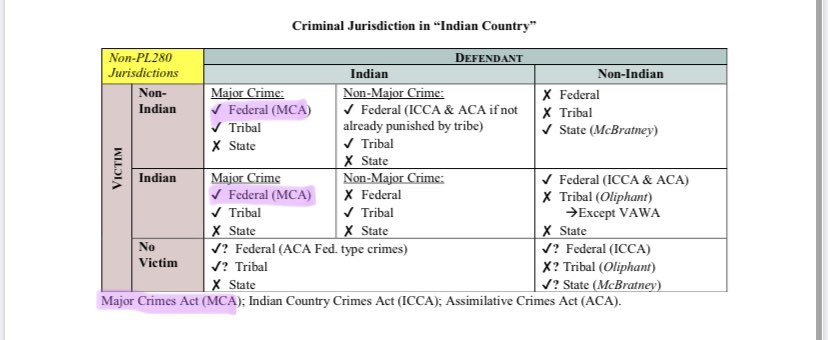
🚨Good Morning!! Pre-Argument 🧵 1 of 3 explaining the constitutional challenges to #ICWA that #SCOTUS will hear today in Haaland v. #Brackeen: The Equal Protection Clause (EPC). 1/14
The EPC of the 14th Amendment (w/ Due Process Clause of 5th) guarantee equal protection of the law, no matter who you are. #SCOTUS interprets this not to prohibit laws that treat categories of people differently but says laws are disfavored if they target disfavored groups. 2/14
The more disfavored the group, the more scrutiny we apply to the law. Or that's how it started. Now we look at certain kinds of classes of categorizing people as more suspect--like racial classifications--even when they target the majority group. 3/14
You with me? That's how we have challenges to affirmative action by White Americans. Because racial classifications at all are disfavored & so it’s harder for the government to use them, its presumptively illegal. 4/14
To use racial classifications, the government must prove it has an extremely good reason (compelling government interest) & design the use of race very precisely to achieve that reason (narrowly tailoring). This is VERY HARD. 5/14
For less concerning categories, like people w/ certain credentials or job experience (think licensing) it's fine if the government has a legitimate reason & the law is rational. I repeat: what the gov. does has to be justified & rational but it doesn’t need to be perfect. 6/14
Since a 1974 case called Morton v. Mancari, #SCOTUS recognized that Indian is a racial category, but that tribal citizenship is not inherently racial because tribal citizenship is both over & underinclusive of Indians as a race. 7/14
I.e. there are lots of White or White passing tribal citizens, Black freedmen tribal citizens, & plenty of Indians who are not eligible for enrollment in a particular tribe. Using tribal citizenship means less scrutiny: rationally related to U.S.'s duty to Indians. 8/14
In #Brackeen, #SCOTUS is revisiting Morton v. Mancari. It might say that #ICWA, which uses tribal citizenship to decide which Indian children to protect, is racially discriminatory & thus deserves higher scrutiny--strict scrutiny—to survive a challenge under the EPC. 9/14
Why is higher scrutiny so bad? Well, because it gives the Supreme Court a lot of power. They get to decide what is an important enough government interest & can strike down laws that aren’t perfectly tailored to that interest. 10/14
For example, under strict scrutiny, making up for past discrimination is not a good enough reason for affirmative action (only diversity was) & the specifics of how schools design these plans are subject to constant legal challenges. 11/14
If this happens to ALL OF INDIAN LAW, we enter an era where every single use of the word Indian in federal law & an entire title of the U.S. Code, is constitutionally suspect. Every program for Indians, from Indian Health Service, to Commodities, to reservations. 12/14
EVERY SINGLE ONE of those laws & programs could be subject to challenge. And the very idea that tribal governments can exist would be called into question. People could challenge the very existence of tribal governments as an unconstitutionally race-based. 13/14
This is why Indian Country is SO WORRIED about this case. This EPC challenge attacks a pillar that supports the entire rest of tribal sovereignty & federal Indian Law.
But it’s not the only challenge that does...See my next thread! 14/14
But it’s not the only challenge that does...See my next thread! 14/14
• • •
Missing some Tweet in this thread? You can try to
force a refresh





